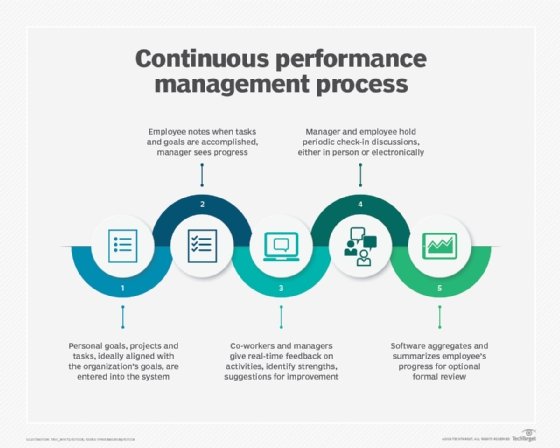
Getty Images/iStockphoto
AI for performance appraisals: Challenges and tips
HR, managers and employees are all trying to navigate the AI hype and use the newer tools to best support the performance management process. Here's how to get it right.
Using AI tools to assist with performance reviews presents numerous challenges. So, it's important to understand these and proceed with care.
In addition to the AI features provided by HR vendors, performance review participants can also use external AI tools sold by third-party vendors. Regardless of the tool, anyone who uses it will need to be on the lookout for AI bias, embellishment, incorrect reporting, and unrealistic effort and time expectations. They'll also want to understand areas in the performance review process where AI can lend the most support.
5 challenges of using AI for performance reviews
As with other areas of HR, such as recruitment, AI can potentially save time and work. However, understanding its limitations and downsides is key. Below are some core challenges to review and address.
AI bias
AI learns from the data developers and others train it on. If the data is broad and equally represents different types of people with various experiences, the AI engine has a better likelihood of producing unbiased results. However, a smaller data set or one from homogeneous subjects may produce bias.
To counter this, the implementation team should test and validate AI systems and third-party tools for their results. In addition, the team should regularly set aside time to continue validating outputs as the performance management system incorporates more data.
Embellishment
Running an employee's performance feedback through AI might result in the employee's accomplishments being overly glowing and not accurately reflecting the work performed by the employee. Alternatively, the AI system might be overly harsh on an employee.
The manager can help negate this challenge by validating and modifying the initial text provided by AI. But the manager can also enlist AI to support the modifications.
For example, if the manager wants a more positive review, AI will take the summary it provided and change some of the words to make them more in line with the manager's request. This can include changing a word from "sometimes" to "always" or "meets" to "exceeds."
Incorrect reporting
Many people involved in the performance review process, such as managers, use AI to summarize data. AI is useful in providing insights that might be difficult or time-consuming for a person to accomplish. However, AI can make incorrect assumptions that lead to invalid data. That's why fact-checking and validation sets are so important.
Unrealistic effort and time expectations
Some performance review systems provide employees and managers with recommended text to improve the review text they've written. While the text might be an improvement in some fashion, it does add extra work for the participant to review the AI-generated text and validate that it still captures the essence of what they were trying to say without changing the context.
There might also be misconceptions about how much time AI will save a company when it comes to a performance review process. The desire to reduce the timeline might lead to a rushed or incomplete process, for example, not taking the time to review AI-generated text.
Problematic expectations are especially likely as employees and managers navigate the use of AI in the review system for the first time.

AI uses for performance reviews
AI tools can help support performance reviews in a number of ways.
One way is for employees and managers to write their feedback and have the system make a recommendation on how the text can be improved. In this case, AI is looking for ways to improve writing or fix grammar and spelling. This works well inside a performance review form and where the AI functionality is constrained.
Another option is to use an AI tool that accepts questions or prompts, though it's important to understand prompt engineering best practices. In this case, the employee or manager can enter a question and share information, and then ask the AI tool to recommend wording, or suggestions on how best to write a response to a performance review question.
3 areas where AI can help
Performance reviews typically rate and provide feedback on several different areas. Here are just three where AI can help hone feedback and provide ideas for performance improvement.
Employee strengths
A manager can enter performance feedback about an employee and ask the AI tool to summarize the employee's strengths based on all the feedback. This works best when there is feedback from more than one person, such as reviews that include feedback from the employee, manager and peers.
Development opportunities
Often, as part of a performance review, a manager will recommend development opportunities to an employee. A manager might upload the employee's resume, courses completed in the past review cycle, and performance feedback to get recommendations on further training the employee should consider.
Company values
Using AI, a manager might be able to extract the actions an employee has taken that support the company's values. In this case, the manager would need to upload a description of the company's values and the review data for each employee. The AI tool should then be able to extract specific examples where the employee's actions supported a company value.
Any new technology presents a learning curve, and AI tools are no different. Sometimes, the first suggestion or recommendation provided by AI will miss the mark. It is up to humans to help the AI system to improve its responses.
Eric St-Jean is an independent consultant with a particular focus on HR technology, project management and Microsoft Excel training and automation. He writes about numerous business and technology areas.








